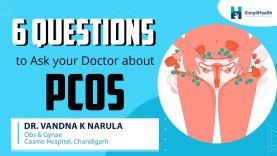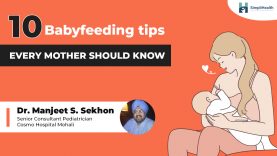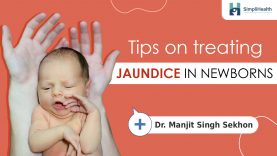Diet Chart of Infant | Feeding Baby for 1 Year | शिशु का आहार चार्ट | 1 साल तक बच्चे को दूध पिलाना?
- 1.08K
- 3 years ago
Dr. Manjit Singh Sekhon
Dr. Manjit Singh Sekhon
Diet Chart of Infant | Feeding Baby for 1 Year
Can we add cow’s milk to the diet of a baby who is less than one year old?
Diet chart of infant, This is at the risk of annoying a lot of my countrymen. I would say not. If you choose cow’s milk unaltered straight from the animal, I would say no. By unaltered, I mean pasteurized or boiled, of course. The composition of a cow’s milk is such that firstly, the cow’s milk protein is an animal protein and not a human protein, which is not suitable for the child. And it can very often cause allergies in the child. So that’s why cows’ milk protein allergy is a real and serious problem. The child starts not to gain weight and becomes very frail and does not feel very well. And you wouldn’t know why this is happening. The child would be crying all day, and you would be clueless. So this could very well be because of cows’ milk.
Cow’s milk for baby’s intestines | Diet Chart of Infant
Also, you would be surprised to know that pure cow’s milk, when given to a child, can cause bleeding in his intestines. So he is actually sometimes losing blood due to cows’ milk being fed to him. So on one side, we are giving him all kinds of supplements to bring his hemoglobin up. And he’s drinking co’s milk and daily losing blood in his stool, which goes unnoticed. So this blood loss is causing anemia. And therefore, this anemia will be just because of cow’s milk.
And similarly, cow’s milk has something very similar called (something). The kind of electrolyte present in our food or milk needs to filter out by the kidney. Which we call ‘kachra’ in Hindi. In human milk, this kachra is very little. So when the baby is drinking the human milk there is very little that he needs to throw out of the body. But in cow’s milk, that is very large.
So cows milk, if at all it has to be given. It could be in an altered form. That is in the form of formulas. Ultimately formulas are based on cow’s milk or, let us say, animal milk. But over there, they have reversed the composition. They altered it in such a way that the child can digest it and assimilate it more freely.
Which other food other than cow milk should not be given to the one-year-old?
Sometimes this list has two aspects. If the child is allergic, then also certain food should not be given to the child. And the other thing is that the child can aspirate. This means while swallowing the food. It can go down the wrong pipe and go into his lungs. So anything hard, like a peanut or crushed nuts (a lot of parents ask me if they can give crushed almonds to the child), the child tries to swallow it, so much of it remains at the back of his tongue. He can’t swallow it in the first attempt. So suddenly, the baby will cough or sneeze, and for this, he takes in a deep breath. So those crushed pieces of nuts then go into his lungs. And depending upon its size, it can block one of its air passages and cause a new problem. And even if it is very small, it can cause inflammation of the lungs and bronchitis, and those things which are avoidable. Because the nutritional value of these crushed nuts to my mind is zero at this age, so they should just be avoided.
How can we avoid food allergies or identify them?
Common food allergies in babies | Diet Chart of Infant
There are two ways to identify food allergies. When you go along practically, you find that the child is allergic or the child is reacting to a particular food.
My 8-month-old granddaughter was sitting at the table, and her mother was having bread with peanut butter, and just out of love and affection, she gave a little peanut butter to the baby, and the baby immediately broke into a rash. She started getting swelling around her eyes, and her face became red, and we immediately had to run to the emergency room. And then, we discovered that she had a peanut allergy. It’s very common nowadays. So basically, now they are not giving any peanuts to her, and they are making sure that anything that comes to their house does not have peanuts. So this is one way that we find out that the child has a food allergy.
And the other thing is to get an allergy test. So there are tests for food allergies, which are related to respiratory, i.e., allergy to something that you inhale like pollen dust mite, etc.
If the mother is not able to breastfeed, then what are the other best options?
So the mother is not able to give a breastfeed has to contest it why. Why is she not able to breastfeed? Because you have to see a movie? Well, no. you can’t do that. It’s not a very drastic thing. The baby only needs to be breastfed for the first six months. But if it is a very valid reason, like the mother has some medical reasons. Most of the medical reasons nowadays are thought to be very disputable.
These reasons are not valid now. In a sense, many diseases were earlier thought to be passed on to the baby by the mother, but they do not. So things have to be clarified whether the mom can feed the baby or not.
Suppose there is a valid medical reason and the mother is not present. Then the best thing to do is, there are human milk banks available. So you can get cold human milk from these banks. But, of course, these are a slightly new concept not available everywhere. And if that cannot be done, then perhaps the next best thing would be formulas. Formulas that resemble mothers’ milk. Your pediatrician would tell you the good brands.
How does nutrition affect a baby’s brain development?
So, this again is a very important thing. Now there are certain chemicals that are now being identified. DHA is one such chemical, which affects the baby’s brain growth. And these chemicals are available in abundance in mothers’ milk. They are not available in animal milk. So when these formulas are made from animal milk, they add this synthetic DHA. It is mentioned on the packaging as well.
This is not natural, DHA. There are more such chemicals. Some of them have not even been isolated as much. So this is the truth, that babies breastfed have larger brains at six months of age. And you can’t dispute that’s because this is an objective observation when you weigh the brain of a child who is formula fed from the day he was born and the other who is breastfed. And the results would show that the breastfed baby has a larger brain, which has more weight, the growth is much more.
Breastfeeds the baby | Diet Chart of Infant
So we have to make a lot of effort to ensure that the mother breastfeeds the baby for the proper development of his brain. And one other very important thing is that breastfeeding the baby protects the mother from breast cancer. So mothers who have fed two babies are much less likely to have breast cancer when compared to those who have never fed a baby. So that’s a huge spin-off. Because breast cancer is the most common cancer in women. So if anything can reduce the incidence of breast cancer is good.
Girls tend to put on a lot of weight during pregnancy. And maybe this is because they are given high nutrition diet and so and so. And if you are breastfeeding your baby after delivery. Then the entire calorie requirement is going from your body. So you are losing that many calories in a day, and you are losing weight according to that. So you are going to get back in shape much faster. You’re going to lose the extra pounds that you put on during pregnancy much faster when you breastfeed your baby. If not this, then you’ll have to lose it by exercising.
Is there any need for additional supplements for the baby after six months?
Iron and vitamin D are the most important. Then, in addition, some multivitamins also help. But the most important are iron and vitamin D. If you are giving a balanced diet after six months and you include a bit of fruit in it, some kind of protein source, green leafy vegetables, then probably no other supplements are required. But however, achieving that completely balanced diet is sometimes not possible. The baby is fussy, doesn’t eat everything. So then maybe some vitamins, just a cover, are helpful.
With this, we have come to an end for today’s session, it was such an informative hour, and I very much hope that this will help the new mother in various ways. And thank you to the entire hospital staff for making this happen.
Thank you for having me and coming for this interview. And I look forward to doing more of this. Thank you.















Comments (0)